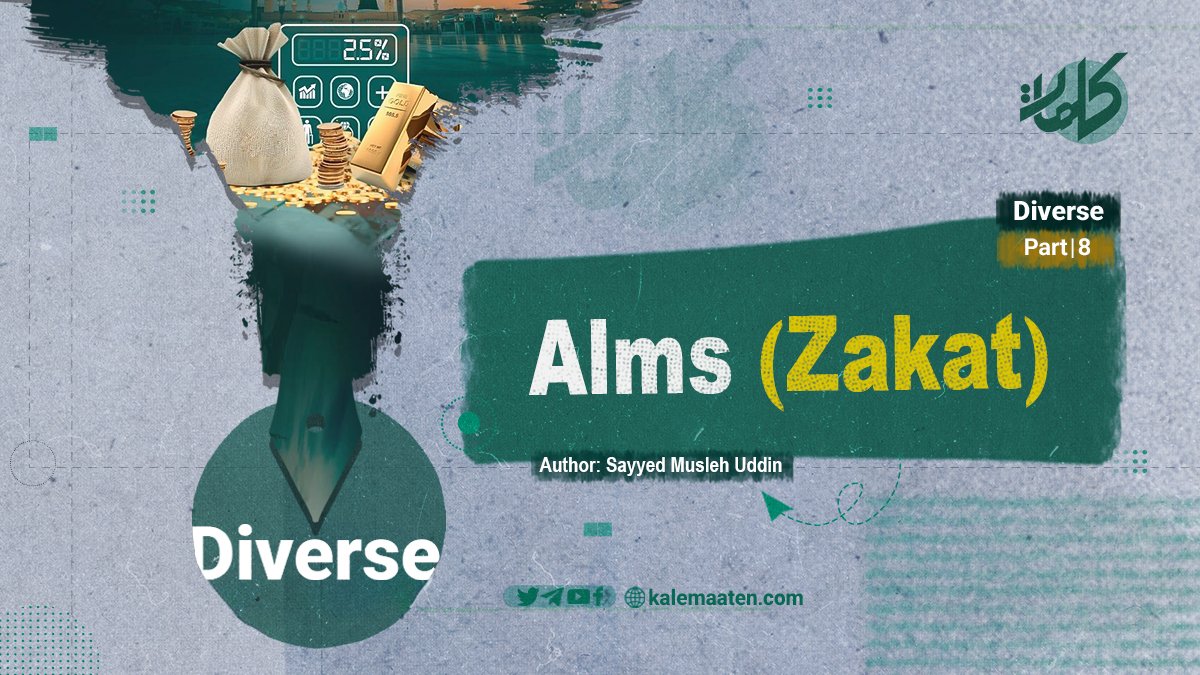Author: Sayyed Musleh Uddin
Alms (Zakat) [Part 8]
Prominent Features of Zakat
3. The Spirit of Piety, Sincerity, and Humility
The third prominent feature of Zakat is the spirit of sincerity, humility, respect, and gratitude that accompanies the performance of Zakat and which its payers possess. This spirit embodies the precise etiquette, noble morals, and precious religious ethos that the Holy Quran encourages and emphasizes. Benevolent individuals who fulfill this obligation are described as being adorned with these qualities.
The Holy Quran dissuades those who give charity and perform good deeds from invalidating their actions through boasting or causing harm, thereby diminishing the value of their work. It expresses this with a miraculous and beautiful style: «الَّذِينَ يُنفِقُونَ أَمْوَالَهُمْ فِي سَبِيلِ اللهِ ثُمَّ لَا يُتْبِعُونَ مَا أَنفَقُوا مَنَّا وَلَا أَذًى لَّهُمْ أَجْرُهُمْ عِندَ رَبِّهِمْ وَلاَ خَوْفٌ عَلَيْهِمْ وَلاَ هُمْ يَحْزَنُونَ. قَوْلٌ مَّعْرُوفٌ وَمَغْفِرَةٌ خَيْرٌ مِّن صَدَقَةٍ يَتْبَعُهَا أَذًى وَاللهُ غَنِيٌّ حَلِيمُ. يَا أَيُّهَا الَّذِينَ آمَنُوا لا تُبْطِلُوا صَدَقَاتِكُم بِالْمَنِّ وَالأذَى كَالَّذِي يُنفِقُ مَالَهُ رِئاء النَّاسِ وَلاَ يُؤْمِنُ بِاللهِ وَالْيَوْمِ الآخِرِ فَمَثَلُهُ كَمَثَلِ صَفْوَانٍ عَلَيْهِ تُرَابٌ فَأَصَابَهُ وَابِلٌ فَتَرَكَهُ صَلْدًا لا يَقْدِرُونَ عَلَى شَيْءٍ مِمَّا كَسَبُوا وَاللهُ لا يَهْدِي الْقَوْمَ الْكَافِرِينَ».
Translation: “Those who spend their wealth in the way of Allah and then do not follow up what they have spent with reminders of their generosity or [other] injury will have their reward with their Lord, and there will be no fear upon them, nor will they grieve. Kind speech and forgiveness are better than charity followed by injury. And Allah is Free of need and forbearing. O you who have believed, do not invalidate your charities with reminders or injury, like one who spends his wealth [only] to be seen by the people and does not believe in Allah and the Last Day. His example is like that of a smooth stone upon which is dust and is hit by a downpour that leaves it bare. They are unable to do a thing with what they have earned, and Allah does not guide the disbelieving people.” [1]
Allah Almighty has praised those who do good deeds with humility and compassion, stating: «وَالَّذِينَ يُؤْتُونَ مَا أتَوا وَقُلُوبُهُمْ وَجلَة أَنَّهُمْ إِلَى رَبِّهِمْ رَاجِعُونَ» Translation: “And they who give what they give while their hearts are fearful because they will be returning to their Lord.” [2]
He also stated: «إِنَّمَا وَلِيُّكُمُ اللهُ وَرَسُولُهُ وَالَّذِينَ آمَنُوا الَّذِينَ يُقِيمُونَ الصَّلاةَ وَيُؤْتُونَ الزَّكَاةَ وَهُمْ رَاكِعُونَ» Translation: “Your ally is none but Allah and His Messenger and those who have believed—those who establish prayer and give Zakat, and they bow [in worship].” [3]
Sometimes He praises those engaged in charity and empathy for their complete sincerity, being devoid of material or spiritual motives, stating: «وَيُطْعِمُونَ الطَّعَامَ عَلَى حُبّهِ مِسْكِينًا وَيَتِيمًا وَأسِيرًا. إِنَّمَا نُطْعِمُكُمْ لِوَجْهِ اللَّهِ لَا نُرِيدُ مِنكُمْ جَزَاءً وَلَا شُكُورًا. إِنَّا نَخَافُ مِن رَّبِّنَا يَوْمًا عَبُوسًا قَمْطَرِيرًا» Translation: “And they give food, in spite of love for it, to the needy, the orphan, and the captive, [saying], ‘We feed you only for the countenance of Allah. We wish not from you reward or gratitude. Indeed, we fear from our Lord a day austere and distressful.'” [4]
Furthermore, Allah Almighty has explained and encouraged that the portion for Allah and the portion for poor and needy servants should come from the same pure and desirable wealth that a person wishes to keep honorably, not from undesirable and unwholesome wealth that no one values or desires. Allah Almighty has said: «يَا أَيُّهَا الَّذِينَ آمَنُوا أَنفِقُوا مِن طَيِّبَاتِ مَا كَسَبْتُمْ وَمِمَّا أَخْرَجْنَا لَكُم مِّنَ الْأَرْضِ وَلَا تَیمَّمُوا الْخَبِيثَ مِنْهُ تُنفِقُونَ وَلَسْتُم بِآخِذِيهِ إِلا أَن تُغْمِضُواْ فِيهِ وَاعْلَمُوا أَنَّ اللَّهَ غَنِيٌّ حَمِيدٌ». Translation: “O you who have believed, spend from the good things which you have earned and from that which We have produced for you from the earth. And do not aim toward the defective [to spend] from it, while you would not take it [for yourselves] except with closed eyes. And know that Allah is free of need and Praiseworthy.” [5]
It is narrated in a Hadith that: “Ayesha (MABH) wanted to give away spoiled meat in charity, but the Messenger of Allah (PBUH) said: ‘Would you give in charity something that you yourself would not eat?'” [6]
In contrast to Zakat, taxes that governments—whether just or unjust—collect from the people are devoid of moral and religious spirit, humility, fear of ostentation and hypocrisy, sincerity, and attention to ensuring that the wealth is pure, pleasing, and valuable. This is because these taxes are often accompanied by a spirit of resentment, dissatisfaction, legal trickery, and the payment of wealth acquired through illegal means. This is characteristic of secular, temporary, and transient laws that are not committed to any belief, religious thought, or spiritual value.
Continues…
[1] Surah Al-Baqarah, Verses: 262-264.
[2] Surah Al-Mu’minun, Verse: 60.
[3] Surah Al-Ma’idah, Verse: 55. Allama Abu Hayyan al-Andalusi states in his book “Bahr al-Muhit”: “Ruku’ here means humility, not the posture of Ruku’ in prayer.” Bahr al-Muhit, vol. 3, p. 14.
[4] Surah Ad-Dahr, Verses: 8-10.
[5] Surah Al-Baqarah, Verse: 267.
[6] Musnad Imam Ahmad, vol. 9, p. 325, no. 3965.



